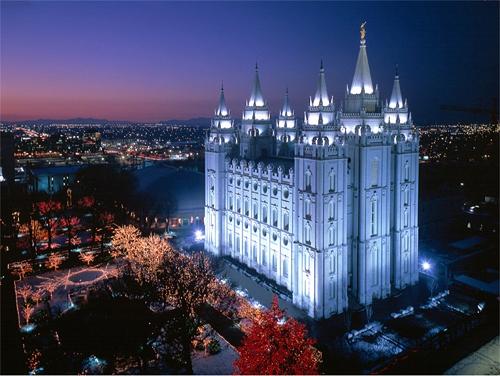Mormon Beliefs: Grace and Works
Before we can initiate a discussion on the relationship between grace and works in Mormon doctrine, some Mormon vocabulary needs to be explained. First of all, Mormons perceive three meanings for the word “salvation.” The first is resurrection, which is a free gift to all mankind from Jesus Christ through His atonement. The second is deliverance from the sin of Adam, whereby all men fell. We are not responsible for Adam’s transgression, because of the atonement of Jesus Christ. The third is going to heaven, rather than hell. Mormonism also has two definitions for “hell.” One is the suffering many will go through in the Spirit World, before resurrection, suffering for their own sins, because they have rejected the saving power of Christ’s atonement. The other is a permanent dwelling place, reserved for the “Sons of Perdition,” those who have gained a perfect knowledge of Jesus Christ, and then deny Him, thus crucifying Him anew. All people, except the Sons of Perdition, will be saved in a kingdom of heaven. This is, perhaps, the most inclusive doctrine pertaining to salvation in all of Christianity.
Mormons also believe, however, in exaltation, and exaltation is a different thing from salvation. As Paul and other seers have indicated, there are three kingdoms in heaven (and many mansions)— the Celestial (with glory as of the sun), the Terrestrial (with glory as of the moon), and the Telestial (with glory as of the stars). Both salvation and exaltation are completely dependent on the grace of Jesus Christ. We can to nothing of ourselves to gain either one, nor can we even draw a breath during our mortal lives without depending upon His grace.
 Mormons fully believe in the biblical scriptures (Romans 3: 10, 23) which state that all men are sinful. Christ is the only sinless person ever to have lived on the earth. Christ is the author of salvation. There is no other name given from heaven through which we can be saved. We are then exalted by the grace of Christ after He sees the set of our hearts and the choices we make. In the Book of Mormon it says,
Mormons fully believe in the biblical scriptures (Romans 3: 10, 23) which state that all men are sinful. Christ is the only sinless person ever to have lived on the earth. Christ is the author of salvation. There is no other name given from heaven through which we can be saved. We are then exalted by the grace of Christ after He sees the set of our hearts and the choices we make. In the Book of Mormon it says,
“For we labor diligently to write, to persuade our children, and also our brethren, to believe in Christ, and to be reconciled to God; for we know that it is by grace that we are saved, after all we can do. …
“And we talk of Christ, we rejoice in Christ, we preach of Christ, we prophesy of Christ, and we write according to our prophecies, that our children may know to what source they may look for a remission of their sins” (2 Nephi 25:23, 26).
“And since man had fallen he could not merit anything of himself; but the sufferings and death of Christ atone for their sins, through faith and repentance…” — Alma 22:14
And again from the Book of Mormon:
Wherefore, my beloved brethren, reconcile yourselves to the will of God, and not to the will of the devil and the flesh; and remember, after ye are reconciled unto God, that it is only in and through the grace of God that ye are saved (2 Nephi 10:24).
Many Mormon scriptures and writings speak of the nature of grace.
Grace is the help or strength given through the Atonement of the Lord Jesus Christ. Through the grace of God, everyone who has lived will be resurrected—our spirits will be reunited with our bodies, never again to be separated. Through His grace, the Lord also enables those who live His gospel to repent and be forgiven.
Grace is a gift from Heavenly Father given through His Son, Jesus Christ. The word grace, as used in the scriptures, refers primarily to enabling power and spiritual healing offered through the mercy and love of Jesus Christ.
Everyone on earth experiences physical death. Through the grace of Jesus Christ, all will be resurrected and will live forever (see 1 Corinthians 15:20–22; 2 Nephi 9:6–13).
Because of personal choices, everyone also experiences the effects of sin (see 1 John 1:8–10; Mosiah 16:4). These effects are called spiritual death. No one can return to the presence of God without divine grace. Through the Atonement, we all can be forgiven of our sins; we can become clean before God. To receive this enabling power, we must obey the gospel of Jesus Christ, which includes having faith in Him, repenting of our sins, being baptized, receiving the gift of the Holy Ghost, and trying to follow the teachings of Jesus Christ for the rest of our lives (see Ephesians 2:8–9; James 2:17–22; 2 Nephi 25:23; 31:20).
The grace of God helps us every day. It strengthens us to do good works we could not do on our own. The Lord promised that if we humble ourselves before Him and have faith in Him, His grace will help us overcome all our personal weaknesses (see Ether 12:27) (Gospel Topics:Grace).
…the word grace frequently is used in the scriptures to connote a strengthening or enabling power:
“The main idea of the word is divine means of help or strength, given through the bounteous mercy and love of Jesus Christ.
“… It is likewise through the grace of the Lord that individuals, through faith in the atonement of Jesus Christ and repentance of their sins, receive strength and assistance to do good works that they otherwise would not be able to maintain if left to their own means. This grace is an enabling power that allows men and women to lay hold on eternal life and exaltation after they have expended their own best efforts” [1].
And of the relationship between grace and works:
Some gifts coming from the Atonement are universal, infinite, and unconditional. These include His ransom for Adam’s original transgression so that no member of the human family is held responsible for that sin. Another universal gift is the Resurrection from the dead of every man, woman, and child who lives, has ever lived, or ever will live on earth.
Other aspects of Christ’s atoning gift are conditional. They depend on one’s diligence in keeping God’s commandments. For example, while all members of the human family are freely given a reprieve from Adam’s sin through no effort of their own, they are not given a reprieve from their own sins unless they pledge faith in Christ, repent of those sins, are baptized in His name, receive the gift of the Holy Ghost and confirmation into Christ’s Church, and press forward in faithful endurance the remainder of life’s journey. Of this personal challenge, Christ said,
“For behold, I, God, have suffered these things for all, that they might not suffer if they would repent; But if they would not repent they must suffer even as I.”
Furthermore, although the Resurrection of the body is a free and universal gift from Christ, a result of His victory over death, the nature of the resurrected body (or “degree of glory” given it), as well as the time of one’s Resurrection, is affected directly by one’s faithfulness in this life. The Apostle Paul made clear, for example, that those fully committed to Christ will “rise first” in the Resurrection. Modern revelation clarifies the different orders of resurrected bodies, promising the highest degree of glory only to those who adhere to the principles and ordinances of the gospel of Jesus Christ.
 Of course neither the unconditional nor the conditional blessings of the Atonement are available except through the grace of Christ. Obviously the unconditional blessings of the Atonement are unearned, but the conditional ones are not fully merited either. By living faithfully and keeping the commandments of God, one can receive additional privileges; but they are still given freely, not technically earned. The Book of Mormon declares emphatically that “there is no flesh that can dwell in the presence of God, save it be through the merits, and mercy, and grace of the Holy Messiah” (2 Nephi 2:8).
Of course neither the unconditional nor the conditional blessings of the Atonement are available except through the grace of Christ. Obviously the unconditional blessings of the Atonement are unearned, but the conditional ones are not fully merited either. By living faithfully and keeping the commandments of God, one can receive additional privileges; but they are still given freely, not technically earned. The Book of Mormon declares emphatically that “there is no flesh that can dwell in the presence of God, save it be through the merits, and mercy, and grace of the Holy Messiah” (2 Nephi 2:8).
By this same grace, God provides for the salvation of little children, the mentally impaired, those who lived without hearing the gospel of Jesus Christ, and so forth: these are redeemed by the universal power of the Atonement of Christ and will have the opportunity to receive the fulness of the gospel after death, in the spirit world, where spirits reside while awaiting the Resurrection. (See Alma 40:11; D&C 138; compare Luke 23:43; John 5:25.)
…for our faith to make a difference, we must act. We must do all that is in our power to change passive belief into active faith, for truly, “faith, if it hath not works, is dead” (James 2:17).
What are Works?
What are the works that God expects us to perform because of our faith? This is a very important question. The first of our works is repentance. Mormon doctrine teaches that we must repent, and that Christ and every prophet that has ever lived have called men to repentance. We must lay our sins upon the altar and purify ourselves by making the effort to change, and then by relying on the grace of God to purify us through the atonement. Repentance is a requirement at the very beginning of the conversion process, as we make the decision to come unto Christ. But it is also a continuing process. We repent daily to try to become more like the Savior, and He guides and helps us as we make that effort. The second of our works is baptism, which is so emphasized in the Bible in the four Gospels. After baptism, we are eligible to receive the Holy Ghost as our constant companion, thus healing and inspiring us to become more like the Savior. Our following works can be summed up in the two great commandments (Matthew 22:36-39): to love God with all our heart, and to love our neighbor as ourselves. We manifest our love for God and our neighbor through service. We are God’s hands; we serve to help with His work.
Mormonism teaches that commandments are gifts from God. One Mormon scripture says, “And they shall also be crowned with blessings from above, yea, and with commandments not a few, and with revelations in their time—they that are faithful and diligent before me” (Doctrine and Covenants 59:4). We are diligent and faithful in keeping the commandments of God. As it says in John 15:10, “If ye keep my commandments, ye shall abide in my love; even as I have kept my Father’s commandments, and abide in his love.” This is our work.
